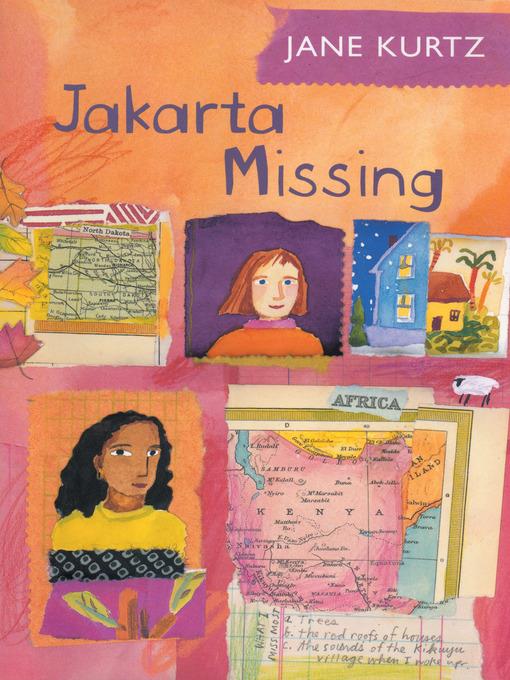
Jakarta Missing
فرمت کتاب
ebook
تاریخ انتشار
2012
Lexile Score
660
Reading Level
3
ATOS
4.5
Interest Level
4-8(MG)
نویسنده
Jane Kurtzناشر
Greenwillow Booksشابک
9780062239266
کتاب های مرتبط
- اطلاعات
- نقد و بررسی
- دیدگاه کاربران
نقد و بررسی

April 2, 2001
Ambitious and complex, Kurtz's (Faraway Home) novel doesn't ultimately succeed, but offers a heady blend of universally relevant insight and an appreciation of the exotic. Raised in Africa, 12-year-old Dakar comes "home" with her parents to spend a year or two in North Dakota. She misses her older sister, Jakarta, who has insisted on staying behind at boarding school, and who has always been the leader. Her fears about her new environment are made all the more painful by her father's disdain for fear—not even an elephant attack scares him. Bookish in a way entirely credible for a shy, expatriate child, Dakar thinks about literary and biblical characters and wishes she, too, could fashion her own quest. "What would Odysseus do?" she asks herself at one point. Kurtz captivates when describing Africa, be it the grace of the wilderness or the chaos of "Nairobbery," as Dakar calls it, and she astutely conjures adolescent dialogue and thoughts. But she overloads her plot. Jakarta is forced to join the family after her school is bombed; shortly after her return, their mom goes off to nurse a long-lost aunt (who doesn't have a telephone); and, without consulting his still-absent wife, their father rushes off to Guatemala to work with earthquake victims (no phones there, either), leaving his daughters alone for weeks. Multiple subplots involve a girls' basketball team, a painful family secret and a cook at Dakar's school who talks in aphorisms. Even with its solid beginning, the novel simply cannot sustain so much activity. Ages 10-up.

May 1, 2001
Gr 5-9-Sixth-grader Dakar struggles to cope with her family's move from Africa, where her father worked to help the needy and gloried in adventure, to North Dakota, where she feels just as much an outsider as she did in Kenya, Egypt, Ethiopia, and boarding school. Her beloved older sister, Jakarta, stays behind; when forced to join them, she is first angry and then distant, immersed in high school basketball. When their mother and father leave suddenly and separately to do good elsewhere, the two girls manage on their own, but Dakar feels bereft. A winter storm provokes the emotional crisis that forces her to call for help. Kurtz convincingly portrays both the bewildering mix of emotions that accompany an expatriate's return "home" and the complications of family life when adults and young adults have different goals and needs. Dakar and Jakarta and, to a lesser extent, their parents are developed characters with realistically complex motivations and less-than-perfect understandings of one another and of themselves. The questions Dakar poses about doing good, and her admirable recall of appropriate Bible quotations, add flavor to the story. However, Jakarta, an adopted child of Irani/African-American/ Japanese heritage, worries, "Is there going to be anyone here who looks like me?" but readers don't see her coping with the fact that there isn't. Although some may be left feeling that the story changes direction too often and loses its way, other readers will be caught up in it and will devour the details of exotic foreign and everyday family and school lives.-Kathleen Isaacs, Edmund Burke School, Washington, DC
Copyright 2001 School Library Journal, LLC Used with permission.

May 15, 2001
Gr. 5-8. Daktar is settling uneasily into her North Dakota home. She has grown up in several African countries, and her revered 16-year-old sister, Jakarta, is still at boarding school in Kenya. The sixth-grader is sure that once Jakarta comes to Cottonwood, everything will be fine. But Jakarta's return only highlights the tensions and the adjustment problems: Mother's depression; Father's longing to return to Africa; Daktar's almost obsessive worrying; and more mundane issues such as Jakarta's ambition to be a basketball star and Daktar's fight with a new friend. In order to manipulate the plot, Kurtz strains the credulity of her readers. For instance, when Daktar's father decides to go to Guatemala for a humanitarian mission, he does so without informing his wife. She is only an hour away taking care of a sick aunt, but the old woman (conveniently) doesn't have a phone, even though she's 80 and lives alone. Kurtz's evocative language borders on flowery, but it does capture the sweetness, mystery, and danger of foreign places (including North Dakota) and helps to express the symbiotic relationship between two sisters--one the briar, the other the rose.(Reprinted with permission of Booklist, copyright 2001, American Library Association.)

























دیدگاه کاربران